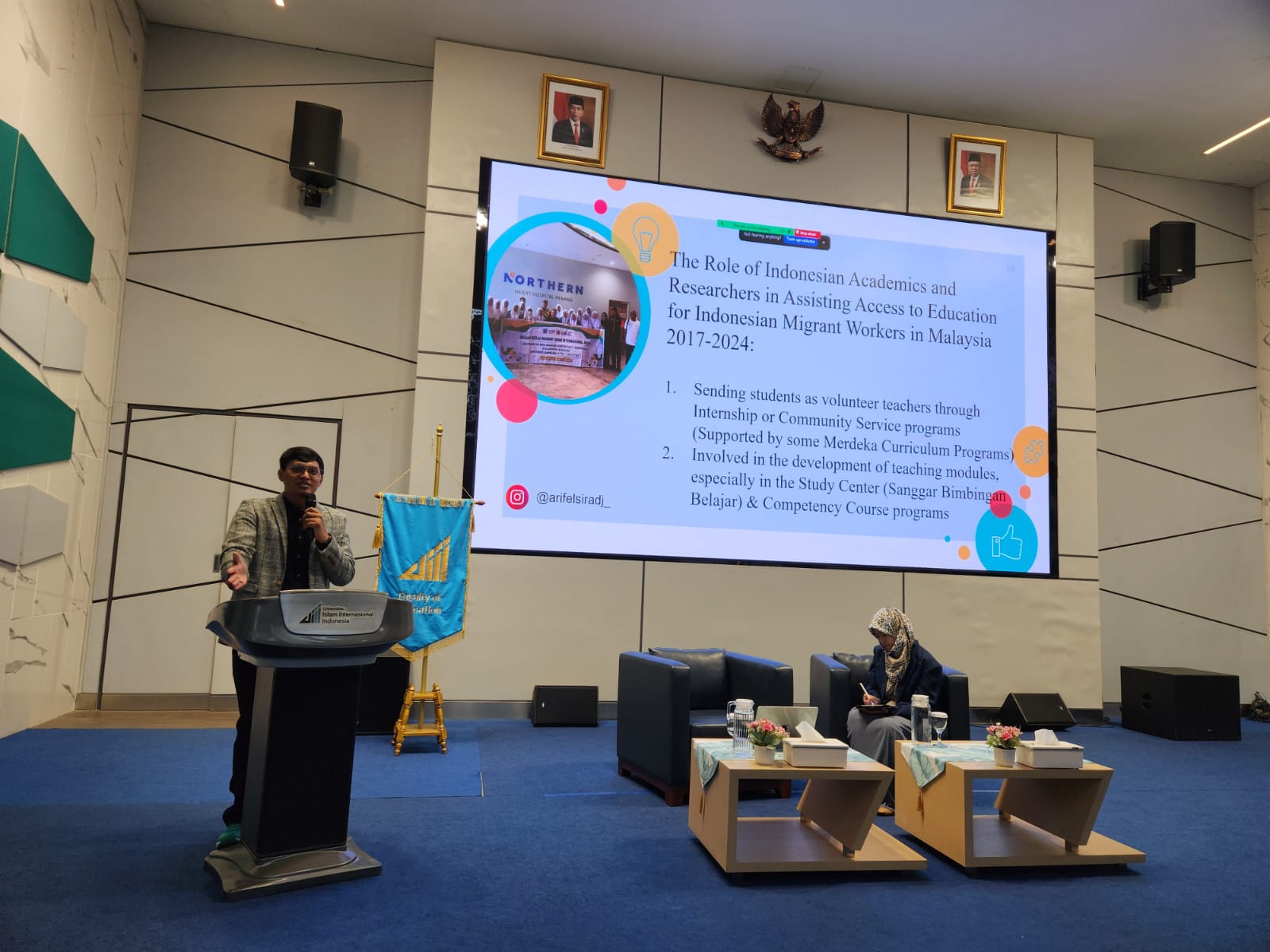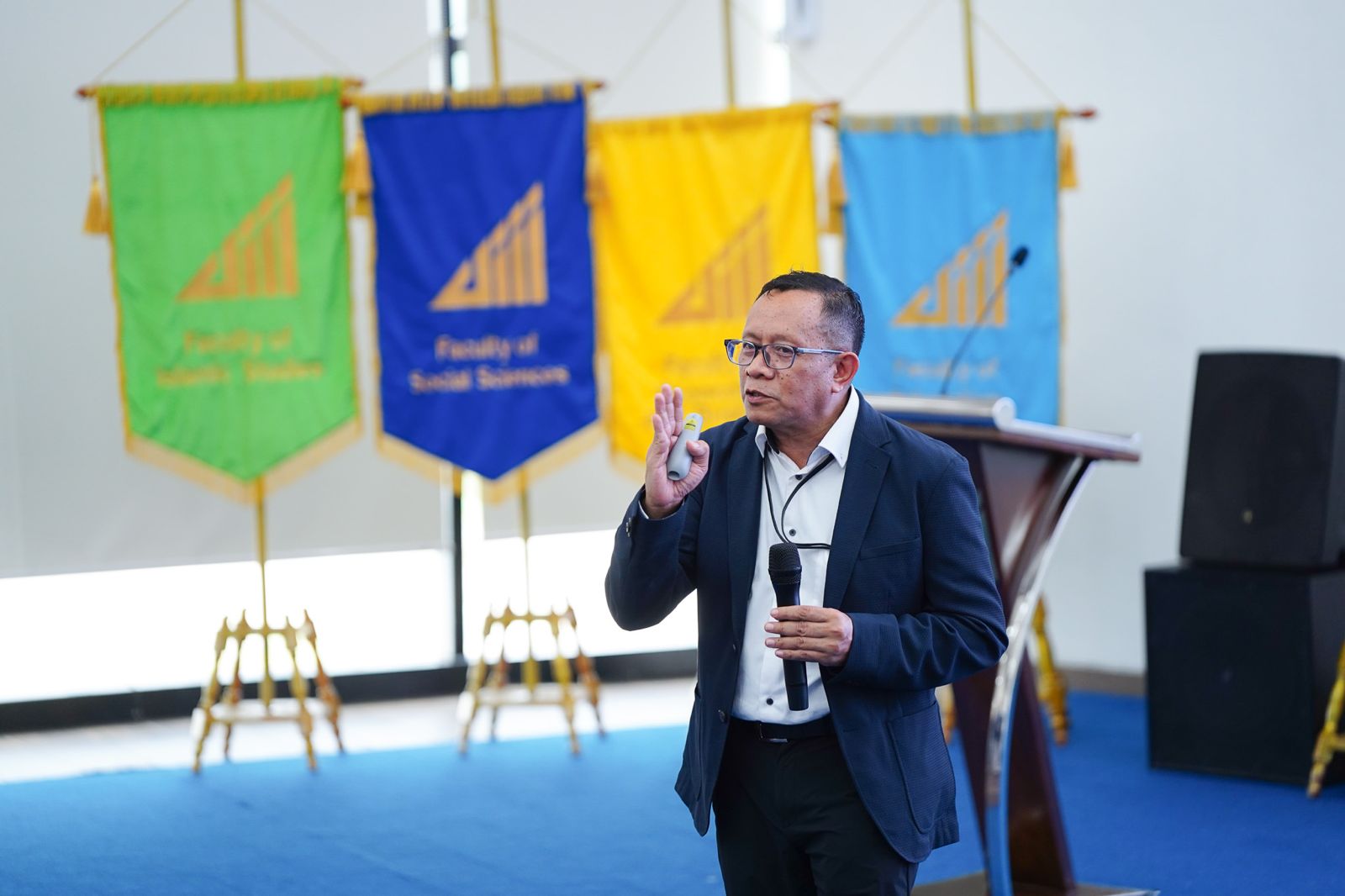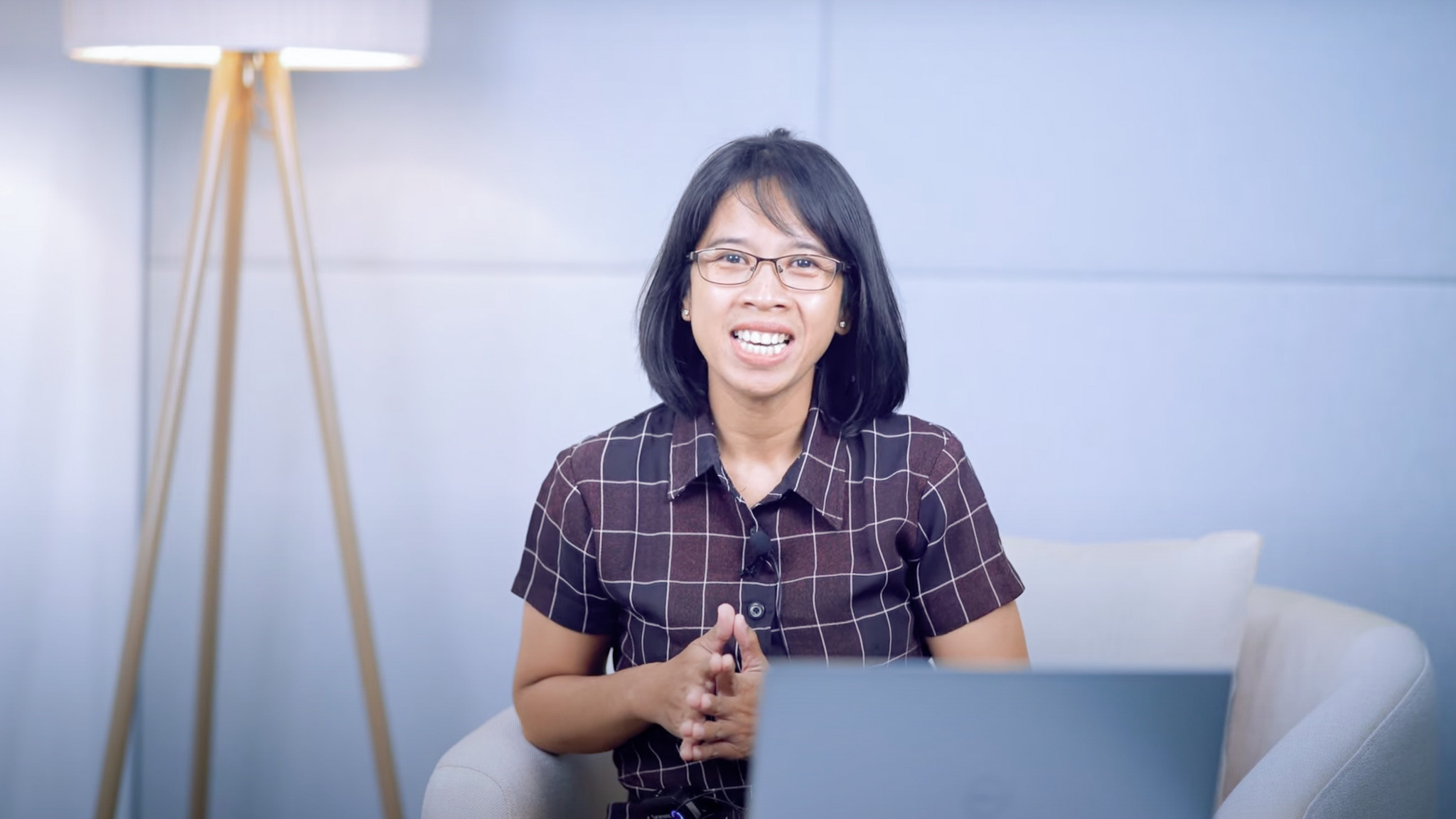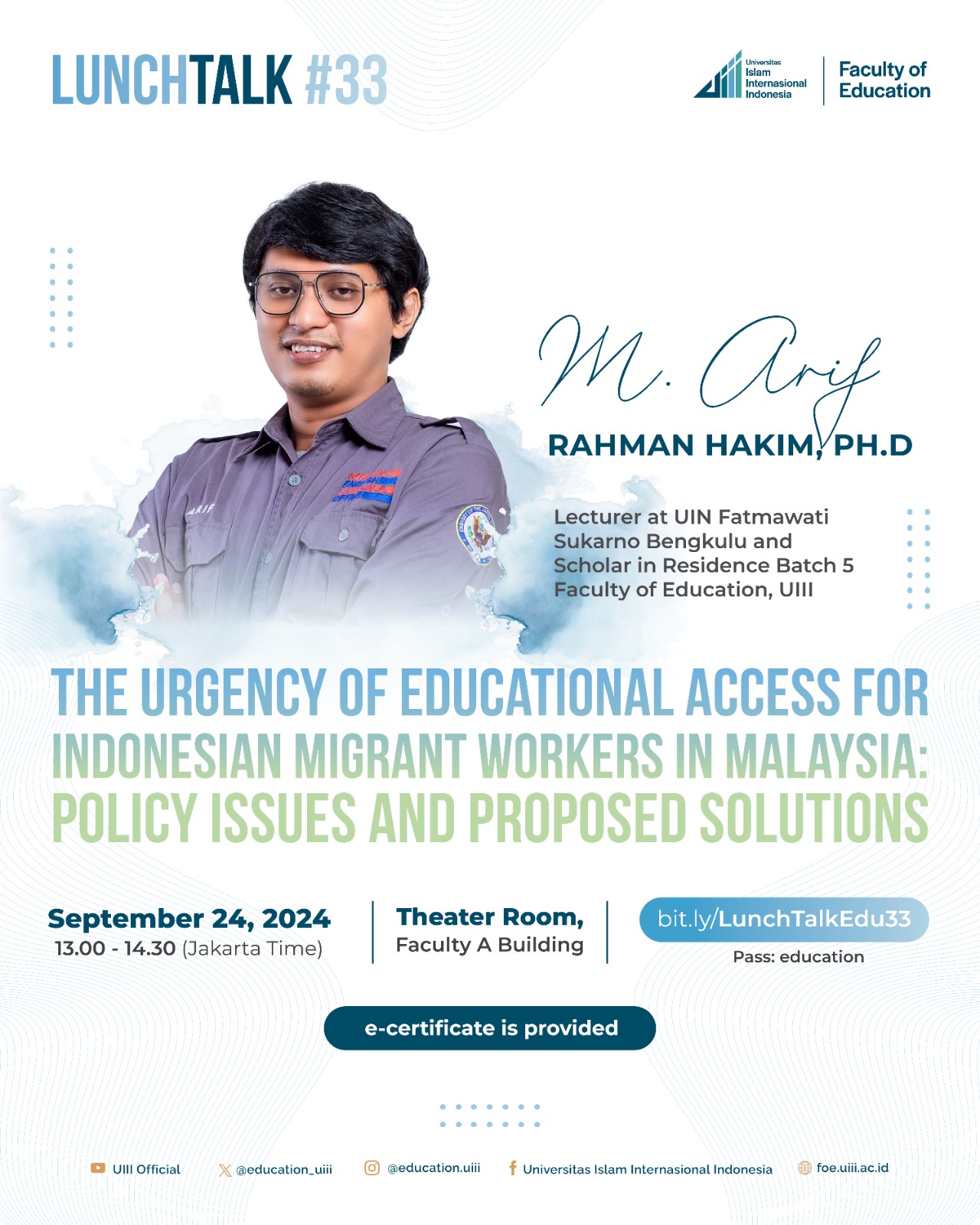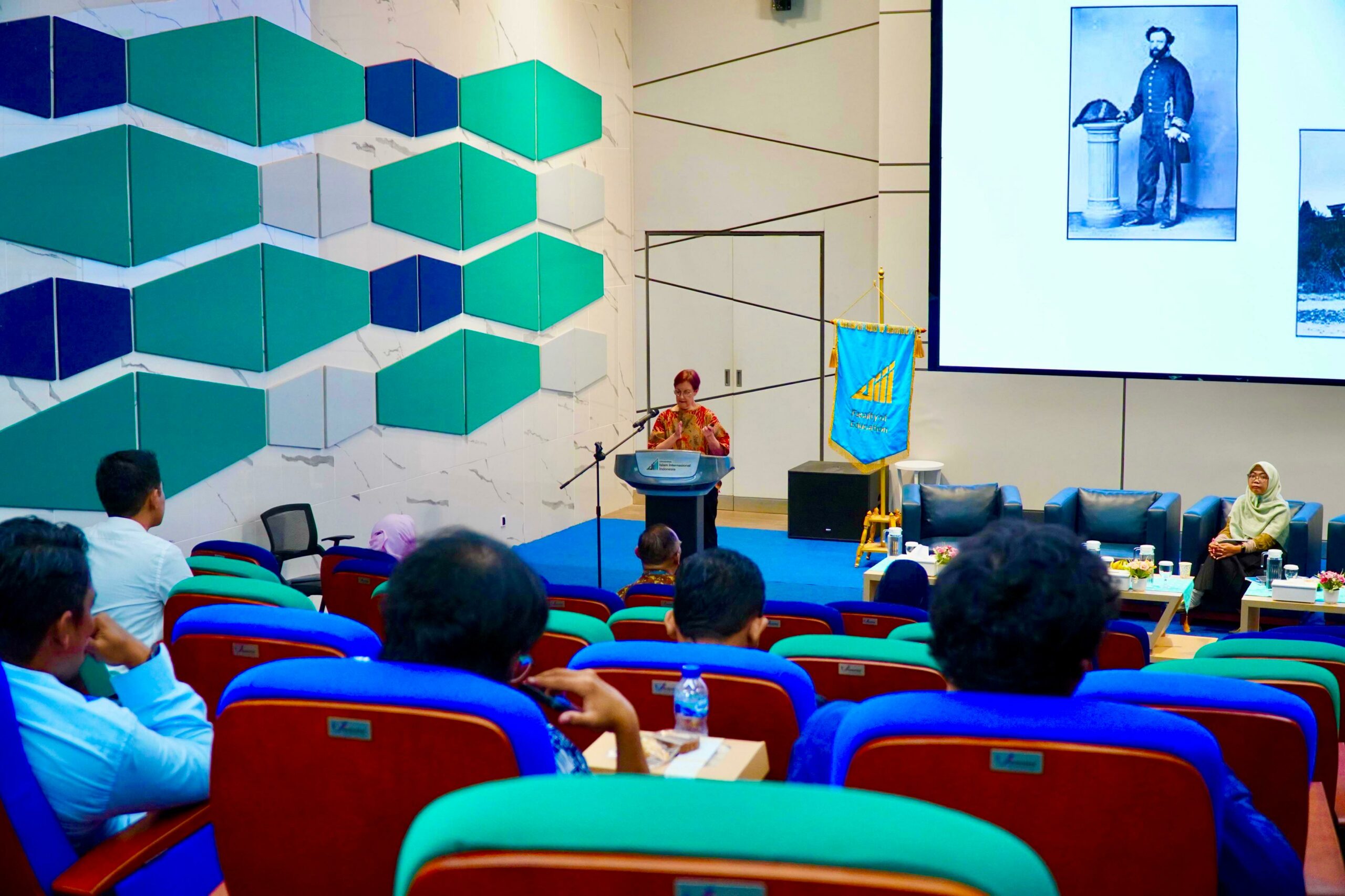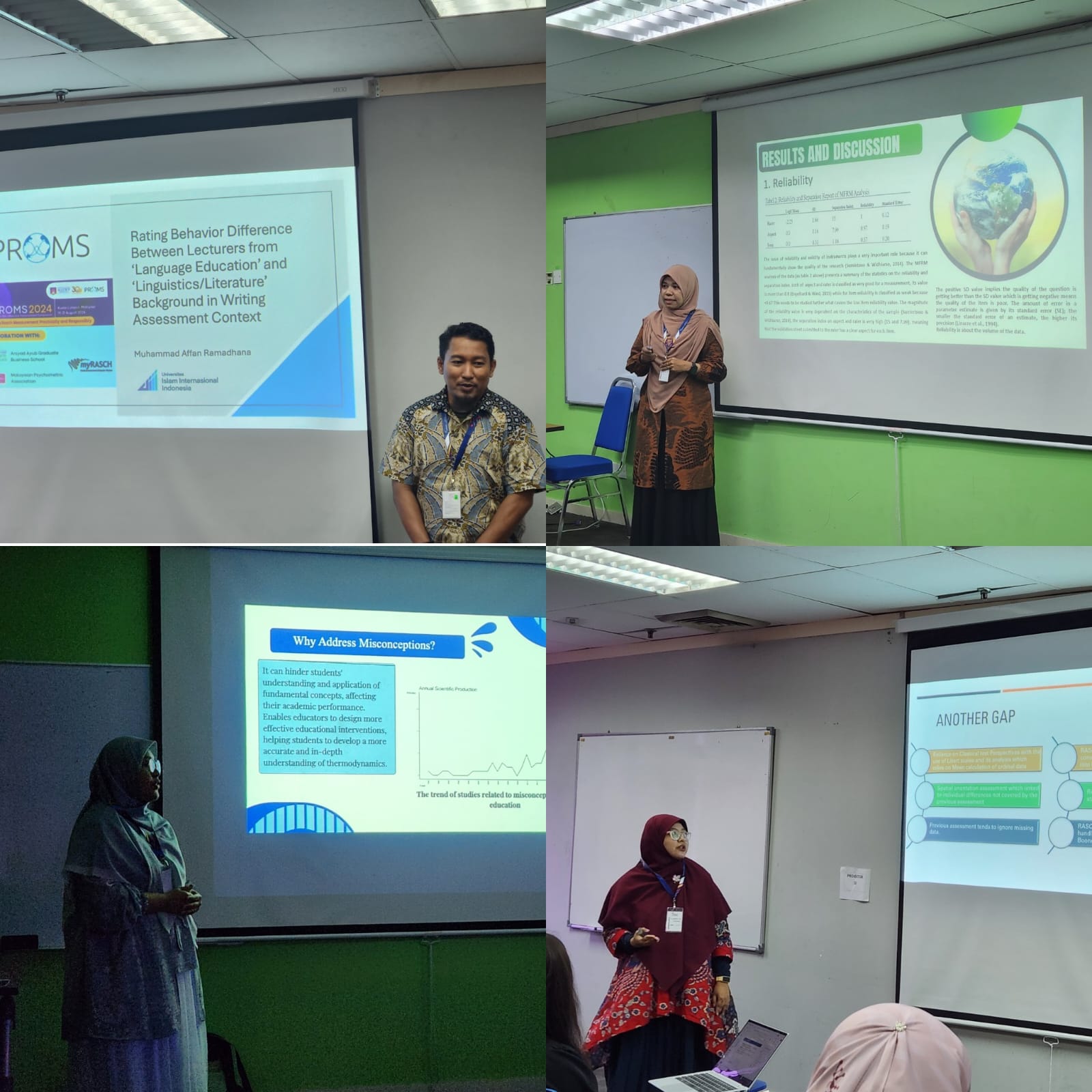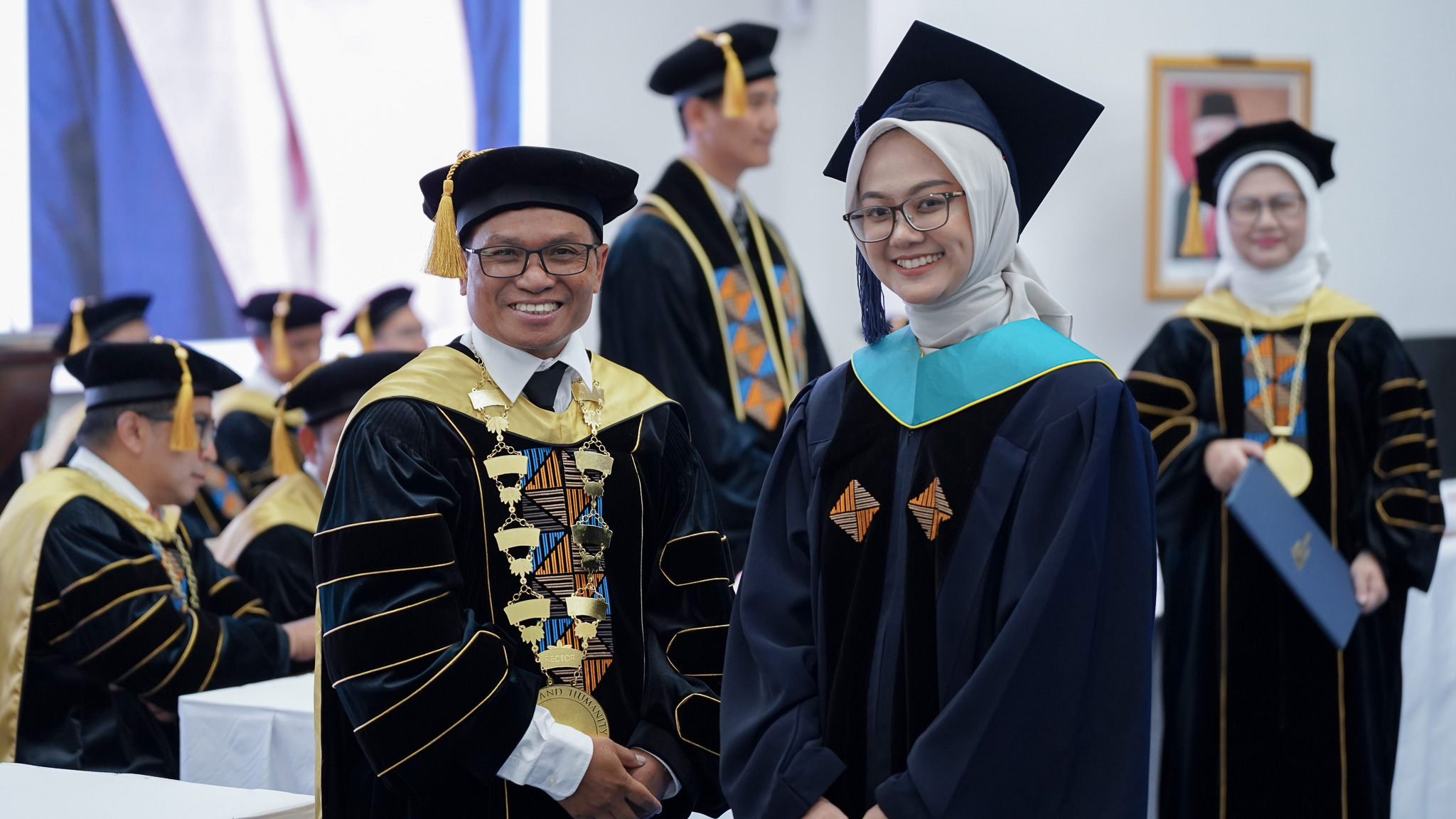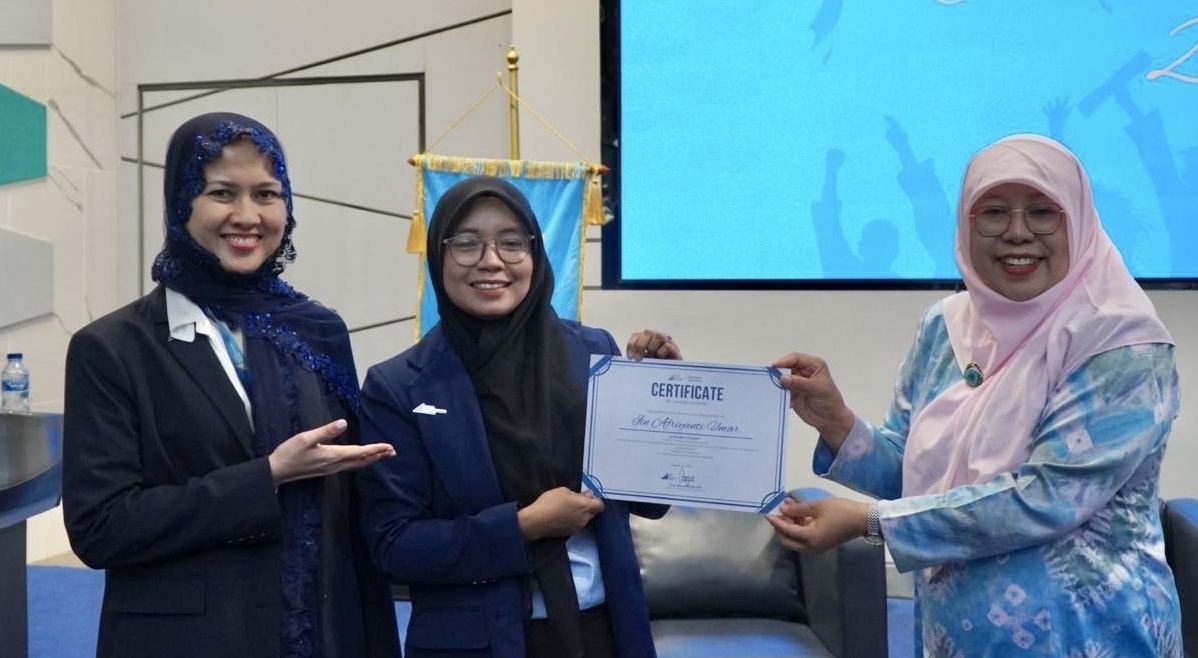LunchTalk #33 on Educational Access for Indonesian Migrant Workers
LunchTalk #33 on Educational Access for Indonesian Migrant Workers
September 26, 2024
Contributor: Supriyono | Editor: Dadi Darmadi
The Faculty of Education at Universitas Islam Internasional Indonesia (UIII) held its 33rd LunchTalk on Tuesday, September 24, 2024, featuring M. Arif Rahman Hakim, PhD, a scholar in residence from UIN Fatmawati Sukarno Bengkulu, with the topic “The Urgency of Educational Access for Indonesian Migrant Workers in Malaysia: Policy Issues and Proposed Solutions.”
Dr. Hakim began by outlining the educational background of Indonesian migrant workers, noting that the majority—about 78%—are junior high school graduates or lower, with half having only completed elementary school. These workers often migrate due to limited job opportunities in their home villages and the prospect of earning higher wages abroad, despite most earning an average salary of MYR 2,000, far below the MYR 5,000 threshold required to bring their families to Malaysia.
During the talk, Dr. Hakim highlighted the educational programs that have been implemented for these workers. These include formal schools established by the Ministry of Education (MoE) and the Indonesian Embassy, which operate three schools across Malaysia. Universitas Terbuka, in collaboration with the Indonesian Embassy, has also developed undergraduate programs that serve over 1,300 students.
Furthermore, 17 institutions under the Sanggar Bimbingan Belajar (community learning centers) initiative provide alternative education through Package A and B programs, which are equivalent to elementary and junior high school education. Additionally, short competency courses have been introduced through collaboration between Indonesian community organizations and educational institutions in Malaysia.
The talk also touched on the role of Indonesian academics and researchers in enhancing access to education. “Scholars have been involved in sending students as volunteer teachers, developing educational modules, and conducting literacy workshops in collaboration with the Indonesian Embassy and community organizations,” Dr. Hakim emphasized.
The LunchTalk series is a flagship initiative of the UIII Faculty of Education, designed to provide an informal yet intellectually stimulating platform for scholars, practitioners, and students to engage in discussions on critical issues in education. Currently a research fellow at the Faculty, Dr. Hakim contributes his expertise in migrant education, bringing global perspectives to the local context while continuing his research on policy interventions for educational advancement.
Strengthening Research Standards: UIII Takes Steps to Establish Ethics Committee
 Strengthening Research Standards: UIII Takes Steps to Establish Ethics Committee
Strengthening Research Standards: UIII Takes Steps to Establish Ethics Committee
September 26, 2024
Contributor: Achmad Jatnika | Editor: Supriyono
UIII is taking a significant step toward establishing its Ethics Committee, a move initiated by the Directorate of Research and Strategic Cooperation, aimed at enhancing its research standards on the international stage.
As part of this initiative, UIII invited Dr. Augustina Situmorang, a member of the Ethics Committee at the National Research and Innovation Agency of Indonesia (BRIN), to advise on the core principles of ethical clearance for research in the social sciences and humanities. The workshop took place on September 19-20, 2024 at the Mercure Hotel, South Jakarta.
UIII Rector Prof. Jamhari highlighted the Ethics Committee as a vital step in aligning UIII's research with international standards, reaffirming the university’s commitment to becoming a center of excellence in research and innovation.
At the event, Dr. Situmorang explained that ethical clearance serves as a vital tool to ensure that research is conducted with integrity and accountability. “Ethically sound research must be respectful, protective, and fair to its subjects, adhering to the norms of the society in which the research is conducted,” she said.
She emphasized that ethical clearance is designed to safeguard research subjects from physical harm, psychological stress or regret, social stigma or ostracization, and legal repercussions resulting from their participation in research. She, further, outlined three key principles of research ethics when working with human subjects, namely respect for persons and communities, beneficence, and justice.
On the respect principle, she emphasized the need to honor autonomy, uphold individual and community dignity, ensure protection for participants, and respect local cultures and traditions. Regarding beneficence, she underscored that researchers must aim to maximize benefits while minimizing potential harm. She also highlighted the importance of evaluating how research outcomes might affect participants.
Finally, on the principle of justice, Dr. Situmorang pointed out that researchers must maintain a fair balance between the burdens and benefits of research participation. She stressed that participants should be treated with consideration for their individual backgrounds and conditions, with special protections in place for vulnerable subjects.
The establishment of the Ethics Committee at UIII aims to ensure that all research conducted at the university adheres to rigorous ethical standards, fostering a culture of integrity and responsibility. By implementing these practices, UIII aims to elevate the quality and credibility of its research outputs, further strengthening its global reputation and supporting its mission to become a leading hub for ethical and innovative research.
Dr. Rifqi Muna's Call for Academic Integrity to the New Student Cohort

Dr. Rifqi Muna's Call for Academic Integrity to the New Student Cohort
September 18, 2024
Contributor: Supriyono | Editor: Dadi Darmadi | Photo: Achmad Jatnika
One of the highlights during the UIII Convocation Week 2024 was a thought-provoking presentation by M. Rifqi Muna, PhD, Head of the Academic Senate, on “Student Code of Conduct at UIII.” Moderated by M. Yazid, Lc, Head of the International Office and Student Affairs, the session provided a deep dive into the ethical framework that guides the UIII community.
Dr. Muna began by redefining the role of students at UIII, emphasizing that they are not just learners but colleagues. This distinction is crucial in a graduate institution where the exchange of ideas and critical dialogue with lecturers is encouraged. It sets the tone for a collaborative academic environment where intellectual growth is a shared journey.
Central to Dr. Muna’s message was the importance of academic integrity and respect. He passionately spoke about the values of honesty, trust, fairness, and respect, which are the bedrock of UIII’s academic ethos. Academic integrity, he noted, is not just a personal commitment but a collective responsibility that upholds the credibility of the entire institution. He detailed the various forms of academic dishonesty, including plagiarism, and stressed the need for a vigilant and proactive stance against such practices.
UIII’s diverse community was another highlight of the session. Dr. Muna celebrated the rich backgrounds, races, ages, and religions that make up the UIII family. He urged students to embrace this diversity and engage in mindful cross-cultural understanding. This inclusivity, he argued, enriches the academic experience and fosters a more holistic learning environment.
Respecting the rights of others and acting responsibly were key themes in the discussion on general conduct. Dr. Muna emphasized that being part of UIII means committing to civility in all interactions. This includes adhering to laws both on and off campus and maintaining respectful behavior in all spaces, including digital platforms. The message was clear: UIII students are ambassadors of the university’s values, wherever they are.
The session also addressed other critical policies. UIII’s stance against discrimination based on political affiliation was unequivocal. Additionally, the university’s commitment to a safe learning environment was also underscored, with zero tolerance for sexual misconduct, including harassment and assault. Dr. Muna encouraged students to actively engage with their peers, fostering a supportive and connected community rather than isolating themselves.
Dr. Muna’s insights provided a clear vision of what it means to be a part of the UIII community. His words resonated with the audience, inspiring them to uphold the highest standards of integrity and respect in their academic and personal lives. This session was a powerful reminder of the values that define UIII and the collective responsibility of its members to live by them.
Learn Math in a Fun Way with Dr. Destina Wahyu Winarti

Learn Math in a Fun Way with Dr. Destina Wahyu Winarti
September 13, 2024
Contributor: Supriyono | Editor: Dadi Darmadi | Photo: Achmad Jatnika & Destina W. Winarti
If you are in the first category, that is great for you. But if you are in the latter, worry not! You are not alone. For many students, math was a challenge that felt insurmountable. It is often seen as distant and difficult, a public enemy that turned once-curious minds into frustrated ones.
But what if it did not have to be this way? What if math could be transformed into a subject that is enjoyable to learn? This is the question that mathematic scholar Dr. Destina Wahyu Winarti, from the UIII Faculty of Education, strives to address. In her latest published journal article, Dr. Destina found a way to make math more accessible, more relatable, and—dare we say it—more enjoyable.
“So, this is an experimental study that assessed the effectiveness of a spatialized mathematics intervention on the mathematical performance and spatial visualization skills of students from an underprivileged Indonesian community,” Dr. Destina said.
The main concept of the study is the so-called “spatial reasoning,” which is “the ability to visualize and manipulate objects in space.” This is a skill we all use in everyday life, such as when we pack a suitcase, arrange furniture, or even navigate a crowded room. In her study, Dr. Destina asked, could this everyday skill be the key to unlocking a better understanding of math?

To find out, she teamed up with Assoc. Prof. Sitti Maesuri Patahuddin and Prof. Tom Lowrie from the University of Canberra, Australia. Together, they conducted a study with 407 eighth-grade students, dividing them into experimental and control groups. The experimental group received the spatial mathematics intervention, while the control group continued with the standard mathematics curriculum.
For the experimental group, Dr. Destina and the team introduced a new kind of math lesson, one that incorporated spatial reasoning into the curriculum. Instead of just memorizing formulas, students were encouraged to visualize problems, think about shapes, and explore solutions in a more hands-on, intuitive way.
“The pre-test and post-test indicated that the students receiving spatial intervention exhibited significant improvements in spatial visualization skills and mathematics performance compared to those who did not,” Dr. Destina explained. “This suggests that one of the possible solutions to improve students’ mathematics performance and their spatial ability is through spatializing the mathematics curriculum.”

Dr. Destina’s findings in innovating mathematics education have the potential to improve student's math performance, especially for those who have traditionally struggled with the subject. By integrating spatial reasoning into the curriculum, she has shown that math can be more than just numbers and equations—it can be a dynamic and engaging subject that taps into students’ natural abilities and interests.
Dr. Destina’s study aligns with the values that UIII upholds in conducting breakthrough research that can generate innovations and make impacts on societies, not only in the education aspect but also in other fields such as economics and business, politics and social sciences, and Islam and Muslim societies.
source: https://uiii.ac.id/news/preview/57662/home/learn-math-in-a-fun-way-with-dr-destina-wahyu-winarti
Lunch Talk #33: The Urgency of Educational Access for Indonesian Migrant Workers in Malaysia: Policy Issues and Proposed Solutions

You are invited to join the Lunch Talk #33 at the Faculty of Education, UIII
M. Arif Rahman Hakim, Ph.D. (Lecturer at UIN Fatmawati Sukarno Bengkulu and Scholar in Residence Batch 5, Faculty of Education, UIII) will share about: “The Urgency of Educational Access for Indonesian Migrant Workers in Malaysia: Policy Issues and Proposed Solutions”.
This talk aims to describe the conditions of Indonesian migrant workers' access to education in Malaysia, Malaysian government policies and strategic steps that have been taken by the Indonesian government as well as alternative education designs for Indonesian migrant workers in Malaysia.
Day/Date: Tuesday/September 24, 2024
Time: 13.00-14.30 WIB
Place: Theater, Faculty A Building
Online participation:
https://bit.ly/LunchTalkEdu33
E-Certificate is provided
Thank you!
Recorded on YouTube
Lunch Talk with Dr. Elizabeth Summerfield Shares Insights on ‘Finding Your Voice in Research’

Lunch Talk with Dr. Elizabeth Summerfield Shares Insights on ‘Finding Your Voice in Research’
September 05, 2024
Contributor: Supriyono | Editor: Dadi Darmadi
The UIII Faculty of Education hosted its 32nd Lunch Talk on August 27, 2024, featuring Dr. Elizabeth Summerfield, a visiting research fellow from the University of Adelaide and a representative of Australian Volunteer International (AVI). Dr. Summerfield delivered an insightful presentation titled “Finding Your Voice in Research: When the ‘Personal is Political.’”
At the event, Dr. Summerfield shared her journey in academia, focusing on how personal experiences can profoundly influence research. She began by recounting her PhD backstory at the University of Melbourne, explaining how her life experiences starting from when she was little till her university life shaped the questions she asked and the research paths she pursued.
In particular, she shared fascinating discoveries about a prominent Australian environmentalist and even touched on connections to Albert Einstein's work. She discussed how Einstein’s philosophies and scientific principles influenced her thinking and research methodology. Specifically, she explored Einstein’s views on the interconnectedness of personal experiences and broader societal issues, encapsulated in the notion that “personal is political.”
She explained that “the personal is political” became a phrase that guided her through the complexities of her research. She emphasized that acknowledging the personal elements in scholarly work not only enriches the research process but also brings a deeper understanding of the subject matter.
She also wove in wisdom from various sources to illustrate her points. She quoted Prophet Muhammad, saying, “The ink of the scholar is more sacred than the blood of the martyr,” to highlight the profound impact of knowledge. She also referenced Nelson Mandela’s famous statement, “Education is the most powerful weapon which you can use to change the world,” underscoring the transformative power of education.
Additionally, she encouraged attendees to maintain a spirit of inquiry, echoing Einstein’s words: “Learn from yesterday, live for today, hope for tomorrow. The important thing is not to stop questioning.”
The presentation concluded with an engaging Q&A session, where participants explored the implications of the ideas of integrating personal narratives into academic research. The discussion highlighted the balance between objective analysis and the subjective influences that shape a researcher’s perspective.
The Lunch Talk is part of UIII’s ongoing initiative to promote critical thinking and encourage scholars to share and/or be inspired by other scholars. Dr. Summerfield’s talk aided the audience—faculty members and graduate students—to reflect on their own research journeys and the role that personal experiences play in their scholarly endeavors.
Faculty of Education's PhD Students Present Papers on Rasch Analysis Conference: Reflection on PROMS 2024

Faculty of Education's PhD Students Present Papers on Rasch Analysis Conference: Reflection on PROMS 2024
Attending the Pacific Rim Objective Measurement Society (PROMS) 2024 conference on 20-21 August was a very enriching experience for us as a group. The theme of this year's PROMS was Advancing Rasch Measurement Practically and Responsibly which was held at UCMI City Campus, Kuala Lumpur, Malaysia. This was the 19th PROMS event. God willing, next year's PROMS will be held in Singapore. As four people who are deeply immersed in the field of measurement in education, we are very proud to have the opportunity to interact with global experts. Some of the keynote speakers were our role models in learning and whose books we refer to. They were Prof. Trevor G Bond (Founder of PROMS), Prof George Engelhard (University of Georgia), Dr Haniza Yon (Malaysian Psychometrics Association), Harris Shah Abd Hamid, Ph.D. (University College of MAIWP) and our role model lecturer in Educational Assessment from Universitas Islam Internasional Indonesia, Bambang Sumintono, Ph.D. These reflections aim to capture the essence of our collective experience, highlighting the key insights we gained, the challenges we faced, and the implications for our future work.
Diverse Perspectives and Global Collaboration
The opening ceremony on the morning of August 20th set a collaborative and inspiring tone for the conference. Welcoming speeches by Dr. Harris Shah Abd Hamid, Dean of FPPK, and Prof. Dr. George Engelhard, President of PROMS, emphasized the importance of cross-disciplinary and cross-cultural collaboration in advancing educational measurement practices. Throughout the two-day conference, we participated in numerous parallel sessions held in various rooms across the campus. These sessions provided platforms for researchers from different backgrounds to present their work. Each parallel room is chaired by a local committee and attended by at least one Rasch expert who are also PROMS board member, giving input and facilitating rich discussions and exchanges of ideas. We were particularly inspired by the presentations that showcased innovative applications of Rasch modeling in diverse educational contexts, highlighting how these techniques can be adapted to meet the specific needs of learners around the world.
Four delegates from UIII PhD students presented papers with their respective scientific fields but used the Rasch Model as a data analysis technique. All the presented papers are the result coming from the process of joining class in Educational Assessment which was taught by our lecturer at Faculty of Education at Universitas Islam Internasional Indonesia. We challenge ourselves to present in this global conference to learn further and get insight internationally. In the first parallel session, Faradillah Haryani presented a paper entitled: Spatial Orientation Assessment: Investigating Differences Between Residents Of Jogja and Non-Jogja Areas Using Rasch Measurement Model, then in a different parallel class Novinta Nurulsari presented with the title paper Misconception Detection Using Rasch Modeling in Thermodynamics, then still in the same class Eka Yusmaita presented with the title of the paper Chemical Literacy Assessment on Green Chemistry Topic Using Many-Facet Rasch (MFRM) and finally Muhammad Affan Ramadhana presented Rating Behaviour Difference Between Lecturers from ‘Language Education’ and ‘Linguistics/Literature’ Background in an Online EFL Writing Assessment Context.
This conference provided us for networking and building connections with fellow attendees. Informal interactions during breaks and the PROMS Dinner at Rumah Tangsi on the evening of August 20th allowed us to engage in meaningful conversations, discuss potential collaborations, and broaden our professional network. These interactions underscored the collaborative spirit of PROMS and reinforced our commitment to contributing to a global community dedicated to advancing objective measurement in education.
Key Insights and Personal Reflections
One of the most memorable aspects of the conference was the chance to meet some of the world’s leading experts in Rasch measurement theory. Interacting with prominent scholars like Prof. Dr. George Engelhard, Prof. Dr. Trevor Bond, and Prof. Dr. Yan Zi was both inspiring and humbling. Additionally, seeing our own lecturer, Dr. Bambang, among these figures further reinforced the importance of our work. Dr. Bambang himself delivered an insightful keynote on the second day of the conference (21st August 2024), which was followed by, yet another thought-provoking session led by Dr. Harris Shah Abd Hamid later that afternoon.
Novinta said, “I was particularly impressed by the quality of the keynote presentations. Every speaker brought forward innovative ideas and advanced research, but one of the most captivating sessions for me was on the ‘Next Generation of Attitude Measurement.’ The discussions opened my eyes to new possibilities in the field and underscored the importance of evolving our methods to stay relevant in an ever-changing educational landscape. In addition to the keynote speeches, the presentations by other speakers were outstanding. I gained a wealth of new knowledge, with one of the most intriguing topics being unfolding assessment. This concept was new to me and captured my attention due to its potential applications in my own work. Presenting my research at this prestigious event was a particularly valuable experience. Sharing my findings with an international audience and receiving feedback from experts in the field provided me with new perspectives on my research. This experience not only boosted my confidence but also inspired me to continue exploring and refining my work.”
Eka, on the other hand revealed that “This is a very high-quality conference that I have visited, I followed it solemnly. Every presenter who presented, the expert would provide supporting input and even explain the theory of the Rasch Model on the Whiteboard until we were amazed at their delivery. We hope that in the future we can remain part of the Rasch Model community and can continue to attend this conference for the following years.”
Faradillah observed that the Rasch experts in each session provided feedback in a manner that was not only insightful but also encouraging. Even in sessions where the focus was not primarily on Rasch, the experts skillfully demonstrated how the method could be applied to enhance the research, pointing out areas where existing approaches were lacking. This approach showed that the prominent figures in these discussions were open to different paradigms and encouraged deeper exploration rather than dismissing alternative views. Faradillah was particularly pleased with the positive reception of her presentation, even though it was recognized that further work, such as increasing the sample size, was necessary. The findings resonated with the international audience, as they see unique cultural aspects of Indonesian people, measured through Rasch modeling. Additionally, Faradillah gained valuable insights from Professor Trevor Bond, who emphasized that Reliability is number, and Validity is more into number. This point was especially important, as it challenged the common practice of describing reliability and validity solely with numerical descriptions.
Finally, Affan presented his work on how lecturers from language education and lecturers from linguistics/literature background behave differently in their rating severity in the context of writing assessment. His work is based on a preliminary study conducted as preparation for his dissertation research. “I was a bit nervous at the beginning, seeing many people including some Rasch experts in the room. I tried to explain as clearly as I could, but I think I was too fast.” Affan said.
Affan continued, “But it was insightful for me when one of the audience members asked for clarification if the rater participants in my study were prepared with the rubric or not. I said no. Then, he emphasized the possibility of raters who do not understand clearly the meaning of each category in the rubric might cause errors and became the most important factor that causes their rating behavior.” It was later revealed that he is Jeffrey Durant, one of Rasch expert from Toyo Gakuen University Japan, whose works focus on multirater assessment and rater network construction in large-scale multirater assessment. “He said that my study was interesting, and he gave me his contact for further discussion.”
Implications for Future Work
The insights gained from PROMS 2024 will undoubtedly shape our future work. The advanced understanding of Rasch modeling will be directly applicable to our ongoing research projects. For Novinta, this will enhance her efforts in detecting misconceptions in educational settings. Faradillah will be focusing on increasing the sample size to enable Differential Item Functioning (DIF) analysis. Eka plans to expand the study of the Multi-Facet Rasch Model and increase the number of persons to improve item reliability scores. Affan will also leverage these insights to further his research in multirater assessment, especially in preparing rater training and more detailed analysis on rater behavior, by applying Rasch modeling to achieve more robust results. We are now better equipped to refine our methodologies and improve the accuracy and fairness of our assessments.
Conclusion
Overall, PROMS 2024 was a transformative experience for us as a group. The opportunity to engage with leading experts, learn about cutting-edge research, and reflect on our own practices has had a profound impact on our professional development. We leave the conference with a renewed sense of purpose and a commitment to applying the knowledge and insights gained to our future work. We are excited about the potential for future collaborations and look forward to continuing our journey in the field of educational measurement with a deeper understanding and a broader perspective.
UIII 2nd Commencement: 88 Graduates, 13 Nations, One Global Community

UIII 2nd Commencement: 88 Graduates, 13 Nations, One Global Community
August 29, 2024
Contributor: Supriyono | Editor: Dadi Darmadi | Photo: Achmad Jatnika
Universitas Islam Internasional Indonesia (UIII) successfully held its second commencement ceremony on Thursday, August 29, 2024, at the Lecture Hall, 6th Floor, Rectorate Building, UIII Campus in Depok West Java.
This momentous occasion saw the conferral of degrees to 88 graduating students from 13 different countries, showcasing UIII’s commitment to fostering a diverse and inclusive academic environment. The graduates hailed from Indonesia, India, Morocco, Ivory Coast, Nigeria, Pakistan, Tunisia, Egypt, Afghanistan, Gambia, Timor Leste, Yemen, and Somalia.
The degrees conferred included a Master of Arts in Islamic Studies (29 graduates), a Master of Arts in Political Sciences (18 graduates), a Master of Arts in Economics (25 graduates), and a Master of Arts in Education (16 graduates). This diverse cohort of graduates reflects UIII’s dedication to academic excellence and international collaboration.
UIII Rector Prof. Dr. Jamhari expressed his pride in the graduates, stating, “Today, we celebrate not only the academic achievements of our students but also the rich diversity and international spirit that they bring to our university. Each graduate has shown remarkable dedication and resilience, and I am confident they will continue to make significant contributions to their respective fields and communities.”
The commencement, also known as graduation, ceremony was a celebration of the hard work and achievements of the students, who have demonstrated exceptional dedication and perseverance throughout their academic journey. The event was attended by UIII’s Chairman of Board of Trustees, faculty members, educational staff, family members, ambassadors and distinguished guests, all of whom gathered to honor the graduates’ accomplishments.
Vice Rector of Academic Dr. Phil. Syafiq Hasyim highlighted the unique approach to this year’s commencement ceremony, saying, “This year, we had the honor of inviting embassy representatives of the graduating students, in addition to their parents and families. This inclusion underscores our commitment to fostering a global community and recognizing the international support systems that contribute to our students’ success. I congratulate all the graduates and wish them the very best in their future endeavors.”
Attending the ceremony was Yemen Ambassador to Indonesia H.E. Mohamed Ali Al-Najar, witnessing one of his citizens, Ebrahim Omar Obaid Basalma, a UIII student at the Faculty of Economics and Business receiving the Best Student Award with a cumulative GPA of 3.98 out 4.00. Also present at the event was Mr. Tor Tobing, Chief Executive Officer at the Finance Ministry of the Republic of Indonesia.
Established based on Presidential Decree No. 57 Year 2016, UIII started its academic activity in 2021 with four faculties: Faculty of Islamic Studies, Faculty of Social Sciences, Faculty of Economics and Business, and Faculty of Education. This is the second time that it has held a commencement ceremony. Last year, UIII inaugurated 72 graduates coming from 13 countries: Indonesia, Egypt, Togo, Ivory Coast, Algeria, Afghanistan, the Philippines, Nepal, Yemen, Cameroon, Pakistan, Gambia, and Bangladesh.
UIII continues to strive towards its mission of providing high-quality education and fostering a global community of scholars. UIII also offers master’s dual degree programs, collaborating with well-known universities worldwide, such as the University of Edinburgh, SOAS University of London, University of Dundee, and Deakin University. UIII looks forward to the continued success of its graduates as they embark on a new chapter of their life either in their professional field or further academic endeavors.
Iin Afrianti Umar Named Best Graduate of Faculty of Education

Iin Afrianti Umar Named Best Graduate of Faculty of Education
August 28, 2024
Contributor: Supriyono | Editor: Dadi Darmadi
In a remarkable achievement, Iin Afrianti Umar has been named the best graduate of the Faculty of Education for the second cohort at Universitas Islam Internasional Indonesia (UIII). With an outstanding GPA of 3.96 out of 4.00, Iin’s dedication and hard work have set a benchmark for academic excellence.
Balancing the dual roles of student and mother, Iin’s journey is a living example of resilience and determination. Her adeptness at managing her academic responsibilities alongside her duties as a mom has earned her widespread admiration from both peers and faculty.
In addition to her academic achievements, Iin was one of three students selected for a research student visit program at Deakin University in Australia. In May 2024, she had the opportunity to work closely with Deakin experts, gaining invaluable insights and guidance for her thesis.
Reflecting on her journey, Iin shared, “Balancing my studies and responsibilities as a mother was challenging, but it taught me the importance of time management and perseverance. Today is not the end, but a new beginning,” said Iin during the faculty’s judicium on August 27, 2024.
At the same event, Prof. Nina Nurmila, Dean of the Faculty of Education, congratulated all the graduating students from the faculty, encouraging them to never stop learning. “Just because you graduated today, does not mean that you stop learning. You should continue learning either through publishing more research articles or pursuing a PhD,” said the dean.
Congratulations to all graduating students, especially for Iin whose success story poses as a shining example of what can be achieved with perseverance and support. Her journey not only highlights the quality of education at UIII but also serves as an inspiration to fellow students balancing multiple roles.

source https://www.uiii.ac.id/news/read/57637/iin-afrianti-umar-named-best-graduate-of-faculty-of-education
Selecting the Top Artisan Woodcraft Projects Using Many Facet Rasch Measurement (MFRM) Model

Mohd Nor, M.Z, Sumintono, B., Nizam, M.S. and Sani, Z. (2024). Selecting the Top Artisan Woodcraft Projects Using Many Facet Rasch Measurement (MFRM) Model. In Zhang, Q. (ed). Proceeding of the Pacific-Rim Objective Measurement Symposium (PROMS) 2023. Atlantis Highlights in Social Sciences, Education and Humanities. https://doi.org/10.2991/978-94-6463-494-5_15

